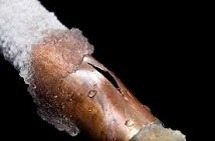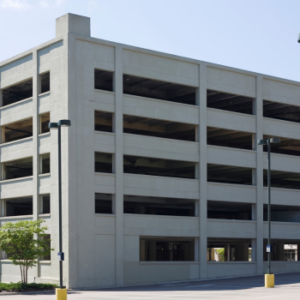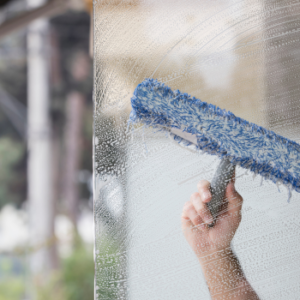Winter 2014 is a season like no other. Snow, freezing rain, warm weather, historically low temperatures and what the meteorologists have coined as the polar vortex.
One major challenge with fluctuating temperatures is implementing appropriate methods to prevent a disaster that can cost thousands of dollars. This is especially true when it comes to preventing a frozen pipe from bursting and causing a flood in your home or office.
Wait – a pipe can burst and cause a flood in both cold and warm temperatures?
Absolutely! As we discuss in today’s article, ice blockages can form inside pipes during cold weather, and unthaw as temperatures begin to warm, which can cause a major flood.
What causes a pipe to burst?
When you place a soda can in a freezer the liquid will freeze into ice, expand, and burst over time. Pipes can also expand and burst in the same fashion as water freezes and forms a block of ice.
Surprisingly, however, a pipe does not burst in the area in which the ice blockage occurs. Instead a pipe burst is a direct result of “continued freezing and expansion inside the pipe, following a complete ice blockage, which causes water pressure to increase downstream – between the ice blockage and a closed faucet at the end. It’s this increase in water pressure that leads to pipe failure,” according to a weather.com article.
How do I prevent my pipes from freezing and bursting?
An effective method to prevent pipes from freezing involves a two-prong approach: before the cold weather arrives and during the cold temperatures.
The American Red Cross provides several excellent recommendations with this two-pronged approach. We highlight some of their recommendations below:
Before the cold weather arrives
- Remove, drain, and store hoses that are used outdoors
- Close interior valves that supply outdoor hose bibs
- Open outside hose bibs to allow water to drain
- Keep outside valves open so that any water remaining in the pipe can expand without causing the pipe to break
- Check to make sure hot and cold water pipes are insulated, especially in unheated areas
- Consider installing specific products made to insulate water pipes like a “pipe sleeve,” UL-listed “heat tape” “heat cable,” or similar materials on exposed water pipes
During cold temperatures
- Keep garage doors closed, especially if there are water supply lines in the garage
- Open kitchen and bathroom cabinet doors to allow warmer air to circulate around the plumbing
- When the weather is very cold outside, let the cold water drip from the faucet served by exposed pipes. Running water through the pipe – even at a trickle – helps prevent pipes from freezing
- Keep the thermostat set to the same temperature both during the day and at night
- If you’re going away during the cold weather be sure to leave your heat on and set to a temperature no lower than 55° F
How do I know if my pipes are frozen?
You will know if a pipe is frozen when water does not gush out when turning on a faucet. Another indication is when toilets don’t refill with water after a flush.
If you’re experiencing this issue then it becomes time to locate the source of the ice blockage and begin the thawing out process.
How do I unthaw my frozen pipe?
The first step is to identify where the pipe is frozen and shut off the water valve corresponding to that section of pipe to prevent water from gushing out once thawed.
As a rule of thumb it’s a good idea to have a mop, bucket and towels nearby in case there is a leak during the thawing process. Also, when unthawing a section of pipe don’t use a propane torch as this can lead to a fire.
Below are some appropriate methods to use when unthawing frozen pipes as also highlighted by the American Red Cross:
- Apply heat to the section of pipe using an electric heating pad wrapped around the pipe, an electric hair dryer, a portable space heater (kept away from flammable materials), or by wrapping pipes with towels soaked in hot water
- Apply heat until full water pressure is restored
- Check all other faucets in your home or office to find out if you have additional frozen pipes. If one pipe freezes, others may freeze too
What do I do if a pipe bursts and causes a flood?
If a pipe happens to burst and cause a flood then call a licensed plumber. Below are a couple of web resources to assist you in finding a plumber:
http://www.plumbingnetworks.com/
http://www.findaplumber.com/
If the flood cannot be cleaned up with a mop, bucket and towels then don’t fret – simply place two calls:
1) Your insurance company to report the flood
2) A professional maintenance company that specializes in flood restoration work
Important items to have in place for general flood prevention:
1) Emergency Power – many homes have an electric sump pump in place. When you lose power to your home, so does your sump pump. Make sure to have a backup power source for your sump pumps, whether in the form of a battery back up, a portable generator or a standby generator.
2) Warning System – there are sump pump alarms available to alert you audibly or even via mobile devices if your sump pump does lose power or is not functioning properly.
3) Insurance – Either through your homeowners insurance policy or other providers, see if you can purchase flood insurance, before you deal with a flood. One resource to check is the National Flood Insurance Program
Ultimately, you can save yourself the headache, stress, and money by taking a few simple precautions to prevent a pipe from bursting and causing a flood during this winter season.
Mister Kleen is a leading provider of contract cleaning services to Commercial and High Security facilities since 1976. Our primary service area is the DC Metro region. We also provide a variety of interior and exterior specialty services.






